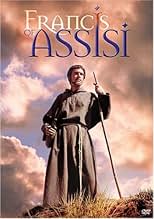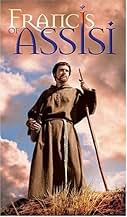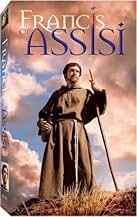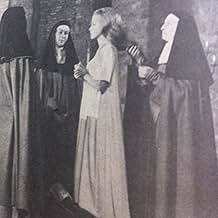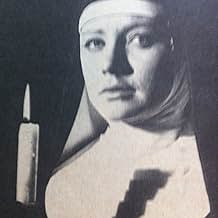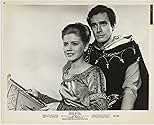In 13th century Italy, Francis Bernardone, the son of an Assisi merchant, renounces a promising army career in favor of a monastic life and starts his own religious order, sanctioned by the ... Read allIn 13th century Italy, Francis Bernardone, the son of an Assisi merchant, renounces a promising army career in favor of a monastic life and starts his own religious order, sanctioned by the Pope.In 13th century Italy, Francis Bernardone, the son of an Assisi merchant, renounces a promising army career in favor of a monastic life and starts his own religious order, sanctioned by the Pope.
- Lucia, Tavern Girl
- (uncredited)
- Friar
- (uncredited)
Featured reviews
And it's not bad at all. The first half-hour or so, unfortunately, is not good. It looks tacky and cheap, like a '60s TV-movie. There's a ludicrous battle scene early on, but this marks the point after which the film starts to get better. The Italian locations are beautiful. The film is overly reverential and was made for a general audience fifty years ago, so we don't really get to see how much of a party animal Francis was before his conversion. Bradford Dillman pulls off the near-impossible job of making this plaster saint interesting. The incredibly lovely Dolores Hart plays Clare, the noblewoman who becomes the first Franciscan nun (and Dolores actually did enter the convent the year after this film, and is still there today, and remains as lovely as ever). There is a subtlety in the relationship between Francis and Clare that often works, but occasionally you get the feeling that the two are behaving in such a restrained way that they might actually be 13th-century Vulcans. Of course, the director here, Michael Curtiz, is responsible for the most romantic movie of all time, Casablanca. Whatever is there between Francis and Clare is left subtle enough for us to appreciate while not peeving the more conservative members of the audience. Stuart Whitman, the nobleman who loves Clare and serves as the third member of this non-triangle, seems miscast here. Stu was never really the nobleman type.
Interestingly, the film takes a dim view of the Crusades, as it shows Christian forces raping and pillaging their way to the Holy Land. There's a scene with Francis meeting the leader of the enemy Saracens that shows their Sultan in a much more civilized light. The film also states that Francis felt his mission from God was to save the Church from its own materialism and heresy, pretty much along the lines of what Martin Luther would try to do two and a half centuries later. I'm not sure the nuns of 1961 really understood what was going on here.
My non-Catholic wife says that Francis has always been well thought of outside the Catholic religion, mainly because he loved animals and is generally felt to have been kind and modest. Not too many reputations have survived eight centuries of questioning and doubt intact. I really didn't expect to like this film, or to get all the way through it, but I was happily surprised to find that I rather enjoyed it.
Unfortunately, the film does come out like a Disney film, with all the colors and dialogue. Hardly present at all is the tension between Francis and his father Pietro. Omitted is the very important event when St. Francis returns ALL his property and clothes to his father and declares, "no longer shall i call you my father, but I shall only say, our Father who art in heaven." - a beautifully done scene in Brother Sun, Sister Moon ten years later. On the good side, it focuses on the supernatural - miracles, God speaking to Francis. This is good because other films tend to make us forget that this is the life of a SAINT, after all.
All in all, a great movie. There should be more films like this to change others' lives.
Stuart Whitman is perfect as always, he is always an interesting ornament to any film he acts in, while Bradford Dillman makes more of a type than a character. Old Finlay Currie is excellent as the pope, and so is Dolores Hart as Sister Clare, but none of these can match any of the Italian actors in the Italian films, since this film completely misses the Italian mentality and is all Hollywood. This was Michael Curtiz' last film but one, (his last became "Comancheros", better although more muddled,) and his professionalism gives standard polish to the whole film, but it hardly becomes more than a filmed legend, like glossy sugared saintly illustrations spiced with typical Hollywood sentimentality on top of it. Sorry, the true St. Francis is nowhere to be found in this film.
The only convincing character of some Franciscan credibility is brother Juniper played by Mervyn Johns. He has understood something of the Franciscan mentality, while all the rest is Hollywood, not at its worst but definitely at its most conventional.
It looked like something from Disney: all primary colored costumes, healthy looking, rosy-cheeked Middle Ages citizens of Assisi, smiling as if they hadn't a care in the world. What were the producers thinking?! There was a little more history in this version though, including Francis' visit to Jerusalem, and his meeting with the Sulton. While the story was certainly comprehensive than Brother Sun Sister Moon, I prefer the latter even with Donovan's soundtrack, which I'm getting used to since I bought the video! Bradford Dillman did a fair job, but Dolores Hart with her teased, helmet-head sprayed hair looked very out of place, sad to say. A lean Stuart Whitman as Paolo played a major part and helped carry the film. I was tempted to not watch the whole thing, but I gave in. If you are a St. Francis admirer you'll watch it and learn a few more things about this remarkable man.
Did you know
- TriviaIn the film, Dolores Hart plays an aristocratic woman who becomes a nun. In reality, Hart left Hollywood to become a nun in 1963. She remains an active member of the Academy of Motion Picture Arts and Sciences, and is the only nun who votes for the Oscars.
- GoofsSeveral times in the movie, you can see the Basilica of Saint Francis in the background. It wasn't built before 1230, four year after Saint Francis' death.
- Quotes
Francis Bernardone of Assisi: This could be so, a voice told me to rebuild the Lord's house. I thought I had to work with stone and mortar, but perhaps I was wrong.
- Crazy credits[Right before the closing title card] Pax et Bonum ("peace and all good [be with you]"). This Latin phrase is the traditional greeting and goodbye of the Franciscans, and it was established by Francis himself.
- ConnectionsReferenced in Laverne et Shirley: The Road to Burbank (1981)
- How long is Francis of Assisi?Powered by Alexa
Details
Box office
- Budget
- $2,015,000 (estimated)
- Runtime
- 1h 45m(105 min)
- Color
- Aspect ratio
- 2.35 : 1





